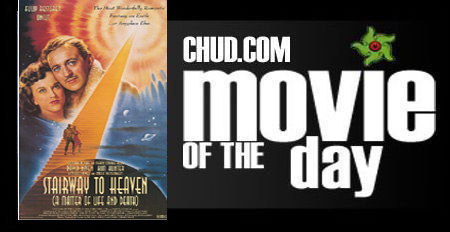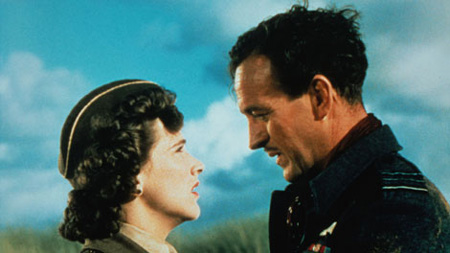
The Film: A Matter of Life and Death (Stairway to Heaven)
The Principals: Directors: Michael Powell and Emeric Pressburger. David Niven, Kim Hunter, Roger Livesey, Marius Goring
The Premise: It’s the darkest days of World War 2. RAF pilot Peter Carter’s (Niven)plane is going down. He’s destined to die. In fact, he’s meant to die, as decreed by his heavenly file. But he doesn’t. Instead, he washes safely ashore and encounters the lovely girl who chatted him through his last hours (Hunter). Naturally, they fall in love, but Heaven is determined to correct their clerical error.

The Great Beyond sends Conductor 71 (Goring), a foppish French aristocrat (or ex foppish French aristocrat, since he lost his head in the Revolution), to bring him in. But Peter refuses. He doesn’t think it’s fair that he should give up his young life for one silly error, especially now that he has the lovely June in his arms. He begins to panic, and June takes him to see her friend Dr. Frank Reeves (Livesey), to have a look at him. He discovers Peter has a brain injury from a previous concussion, and that it could very well kill him. He urges Peter to keep “fighting” Conductor 71 and his heavenly host while he arranges for an emergency surgery. But is it really the result of a concussion? Or is Peter really having to argue for his life in front of the heavenly court?

Is It Good: It’s excellent. It is one of The Archers’ productions, after all, and they weren’t exactly known for shoddy storylines, poor actors, and lousy camera work. Pick any film they made. I guarantee you won’t be disappointed. The Red Shoes and Black Narcissus are probably the most popular in cinematic discussion at the moment, but the two directors could also knock romances out of the park.
Yes, I know — romance. But A Matter of Life and Death is a lean and mature look at wartime love. Most of the film is given up to Peter’s fears about his upcoming trial, and the story spends more time wandering around in heaven than it does with the young lovers. In fact, I think it’s more heartbreaking than romantic since we meet an awful lot of young men cut down in their prime. (The young pilots “checking in” has to be one of the most bittersweet sequences in cinema. Eat your heart out, Ghost and Heaven Can Wait.)

Is It Worth A Look: Absolutely. It’s beautifully shot. Powell and Pressburger were known for their exquisite palette, and A Matter of Life and Death is no exception. It’s not as lush as Black Narcissus, but it’s still a scheme to drink in. I think it’s almost cheekily perverse that they chose to do a reverse Wizard of Oz and shoot the afterlife in black and white.
It also features one of the best fiery plane crashes I know. As Peter’s plane burns up around him, it’s incredibly evocative — you really feel the heat and the icy air whistling through the gaps in the plane. It’s more realistic than anything done in our CG era.
The performances are wonderful, too. Livesey is my favorite of the entire film — a gentle and sharply intelligent man who never once calls Peter crazy or makes him feel less than whole. His character experiences quite the tragic arc, and may be the biggest clue as to whether or not Peter’s experiences on the other side are real or a hallucination.
The subject matter of the film — life after death, a bit of overt Christian imagery — may stick in some throats. But honestly, A Matter of Life and Death presents it in a fairly harmless and neutral manner. There’s no talk of good, evil or the right religion. Everyone seems to just go to the same place. When Peter finally goes before the court, it’s populated entirely by figures from history, not the Bible. (All the old philosophers are there, apparently, unlike Dante’s outlook!) The arguments for and against his life are all based in logic, politics, and love. There’s no “I lived a good life” or “I went to church a lot, I’m Christian.” It’s just a courtroom sequence, with all the tension coming from British and American grudges. Peter’s trial becomes about which is the better country (a raw and tense issue in the middle of the 1940s) and whether the English and Americans ought to just keep to themselves. It’s a pretty wonderful sequence, and still plays as stinging commentary today.

Random Anecdotes: Richard Attenbourgh plays one of the young pilots — blink and you miss him. And the otherworldly escalator was later used in the Pet Shop Boys’ Go West video.